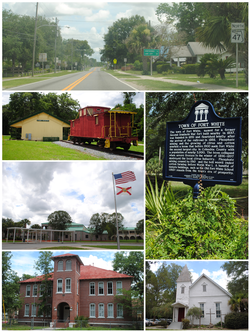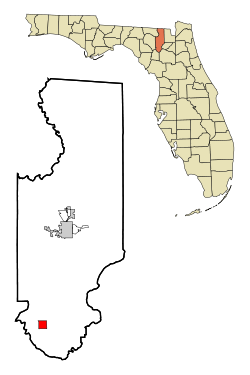Fort White, Florida | |
|---|---|
 Top, left to right: Florida State Road 47 in Fort White, Fort White Train Depot, Fort White High School, Town of Fort White Historical Marker, Fort White Public School Historic District, Fort White United Methodist Church | |
| Motto: "Home of the Ichetucknee River" | |
 Location in Columbia County and the state of Florida | |
| Coordinates: 29°55′21″N82°42′49″W / 29.92250°N 82.71361°W [1] | |
| Country | United States |
| State | Florida |
| County | Columbia |
| Settled | 1836 [2] |
| Incorporated | 1884 [2] [3] [4] |
| Government | |
| • Type | Mayor-Council |
| • Mayor [5] | George Jacob Thomas |
| • Councilors [5] | Lonnie Wayne Harrell, Monica Merricks, Kathryn Terry, and William "Bill" Koon |
| • Town Clerk [6] | Kelly MacPherson |
| • Town Attorney [7] | Lindsey B. Lander |
| Area | |
• Total | 2.41 sq mi (6.25 km2) |
| • Land | 2.41 sq mi (6.25 km2) |
| • Water | 0 sq mi (0.00 km2) |
| Elevation | 72 ft (22 m) |
| Population (2020) | |
• Total | 618 |
| • Density | 256.0/sq mi (98.86/km2) |
| Time zone | UTC-5 (Eastern (EST)) |
| • Summer (DST) | UTC-4 (EDT) |
| ZIP code | 32038 |
| Area code | 386 |
| FIPS code | 12-24500 [9] |
| GNIS feature ID | 2406511 [1] |
| Website | fortwhitefl |
Fort White is a town in Columbia County, Florida, United States, named after a military fort built in the 1830s. It is the closest town to Ichetucknee Springs State Park. Fort White High School and the Fort White Public School Historic District are located within the town's borders. The original school building was constructed in 1915. As of the 2020 census, the population of Fort White was 618, up from 567 at the 2010 census. It is part of the Lake City, Florida Micropolitan Statistical Area.



